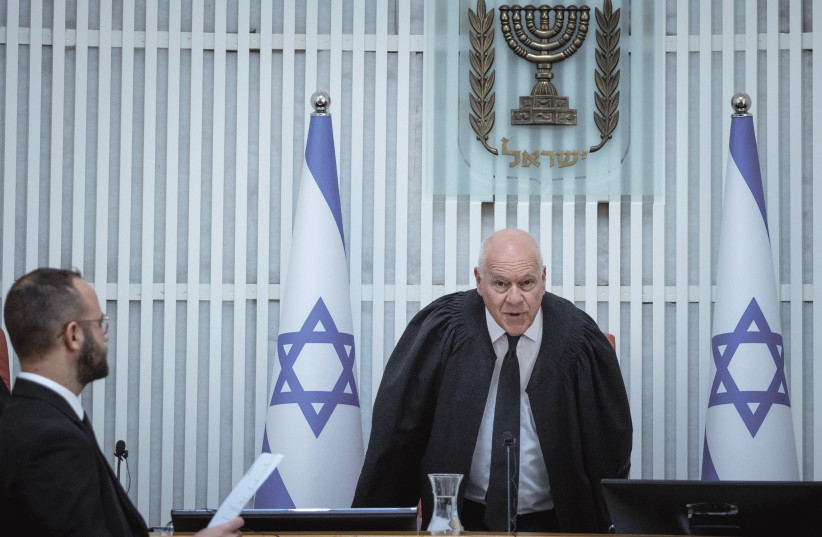Justice Minister Yariv Levin proposed on Monday a compromise to end a stalemate over the appointment of Israel's next High Court Chief Justice and of three judicial appointments to fill vacancies on the bench.
The proposal came in the form of a letter to Interim Chief Justice Uzi Fogelman, alongside a legal filing in an ongoing petition to force Levin to convene the Judicial Appointments Committee in order to make the appointments.
For decades, Israel's Chief Justice was elected based on his "seniority," i.e. the longest standing justice on the bench. The current longest standing member on the bench is Yitzhak Amit, who belongs to the court's liberal wing. Levin, who chairs the Judicial Appointments Committee and who prefers conservative justice Yosef Elron, has refused to bring the issue to a vote in the committee since former chief justice Esther Hayut retired in October. Another justice who retired in October was Anat Baron, and Levin has also refused to vote on appointments to fill the two vacancies on the 15-member bench. In addition, Fogelman is set to reach the age-70 limit and retire in October, meaning that there are de-facto three appointments that need to be filled.
The nine-member Judicial Appointment Committee includes Levin, fellow minister Orit Strok (Religious Zionist Party), Otzma Yehudit MK Yizhak Kreuzer, Yesh Atid MK Karin Elharrar, three High Court justices, and two members of the Israel Bar Association. The judges, Bar members, and Elharrar, who support appointing liberal justices, enjoy a majority in the committee.

Levin's proposal is that Elron serve as Chief Justice for one year until his expected retirement in September 2025, after which Amit will take over. Regarding the three vacancies, Levin proposed that the first be filled by the representatives of the judicial system on the committee proposing two candidates, of which the elected representatives (MKs and ministers) will choose one; the second be filled in an opposite manner – the elected officials will choose two candidates, and the judicial representatives will choose one of them; and the third be a current Regional Court Judge, and approved unanimously.
Elharrar rejected the proposal, writing on X that the proposal was "bending the rules of the game just because he [Levin] doesn't like them."
"The High Court chief Justice is elected by the Judicial Appointments Committee, with a regular majority, and not based on the minister's whims," Elharrar wrote. "Levin wants to break all the existing norms, weaken the judicial system, and force the high court justices into a corner – under the guise of a recycled and bad faith 'compromise' and nice words like 'broad agreement'. He isn't fooling anyone," Elharrar wrote.
Fogelman provided an official response to Levin's compromise where he pointed out the contradiction between the letter’s call for cooperation during “challenging times” and the actions of the author, who had, in Fogleman’s words, been “systematically preventing the exercise of various powers required for the proper functioning of the judiciary.”
He noted that this obstruction had hindered the work of the courts and the services provided to the public, stating: "Your conduct in recent months... is not in line with your call for unity and makes it difficult for the judiciary to operate effectively.”
Fogleman’s letter also addressed the broader impact of the delay, warning that such conduct “is harming the proper functioning of the judiciary, the services provided to the citizens, and the separation of powers.” He argued that the judiciary's essential work is being systematically obstructed at a time when the nation faces unprecedented challenges.
In addition to addressing the delay, Fogleman took aim at the proposal’s suggestion to abolish the seniority system for appointing the Supreme Court President. He explained that this system, which has been in place since the founding of the state, was designed to “protect judicial independence and prevent the politicization of the Supreme Court judges and its Presidents.”
Fogleman stressed that there was “no justification” for deviating from this tradition, a stance supported by most members of the Judges Selection Committee. He further argued that the proposal to appoint two judges to serve as President consecutively “raises significant legal challenges.”
Moreover, Fogleman criticized section 5(b) of the proposal, which he said, while appearing balanced, “actually harms the equality between committee members and effectively silences some of their voices.”
Political agendas
The Movement for Quality Government in Israel, the petitioner in the case attempting to force Levin to appoint a chief justice and fill the vacancies, also rejected the compromise, calling it a "transparent attempt to harm the independence of the Supreme Court." The movement's chairman, Adv. Eliad Shraga, argued that the compromise was merely an attempt to buy time and delay the court's ruling in the case.
"Minister Levin's proposal is not a compromise but a complete surrender to his political agenda; an attempt to desecrate the temple of justice and bring back the judicial overthrow through the front door at a time of war. This will not pass!" Shraga said in a statement.
Amongst other responsibilities, the Chief Justice has the statutory authority to appoint members of a National Committee of Investigation. A number of MKs from the opposition, including Democrats chairman Yair Golan and MK Gilad Kariv, argued that the real intention behind the temporary appointment of Elron was to have Elron appoint the members of a committee to investigate the October 7 Hamas massacre, which the government has yet to.
chair of the Knesset's Constitution, Law and Justice Committee Simcha Rothman appeared to post on X in response to the oppositions to the proposal, simply saying "No parter."
